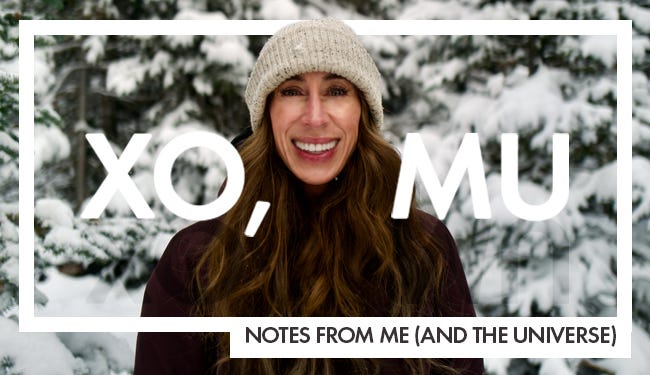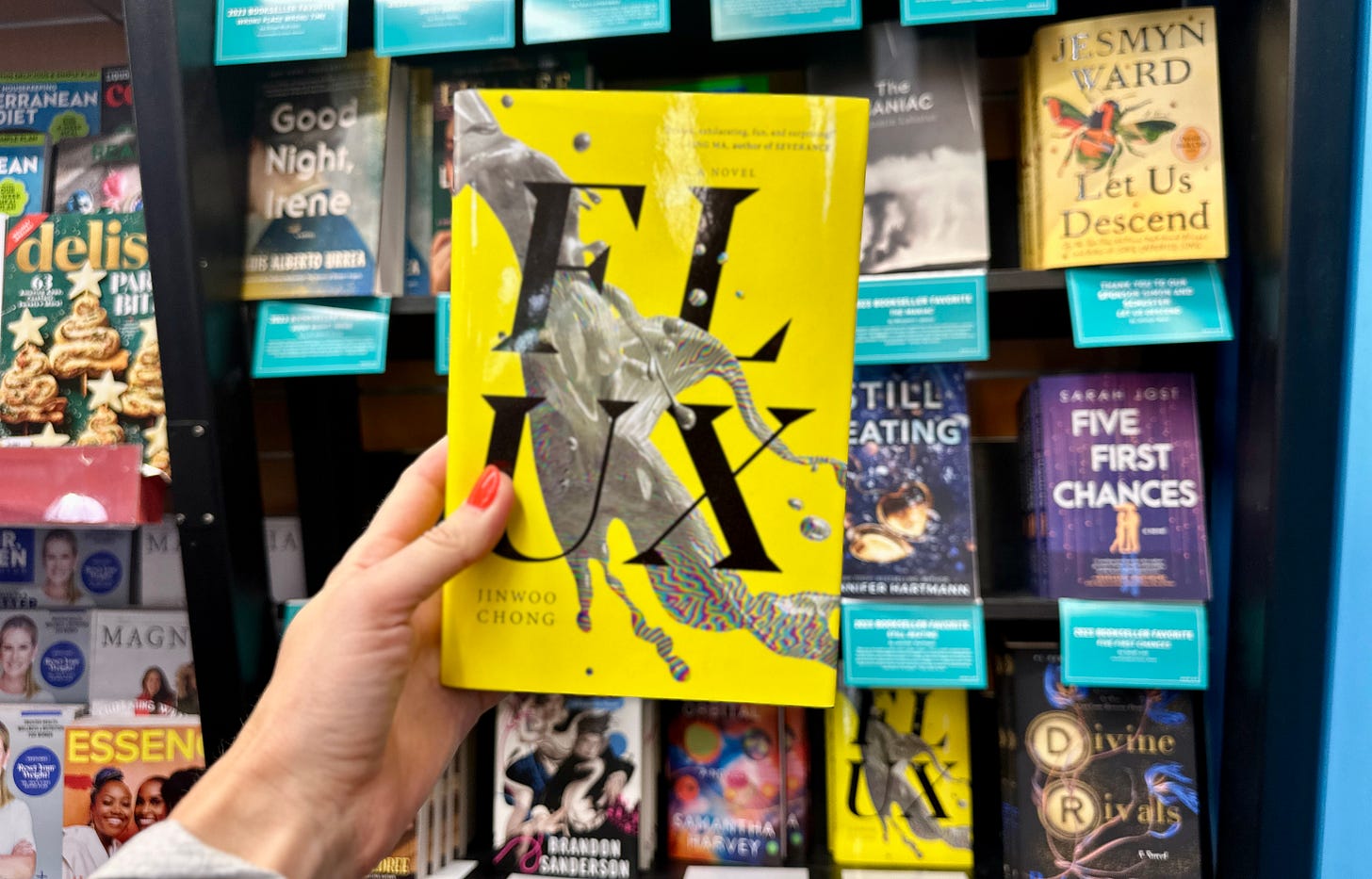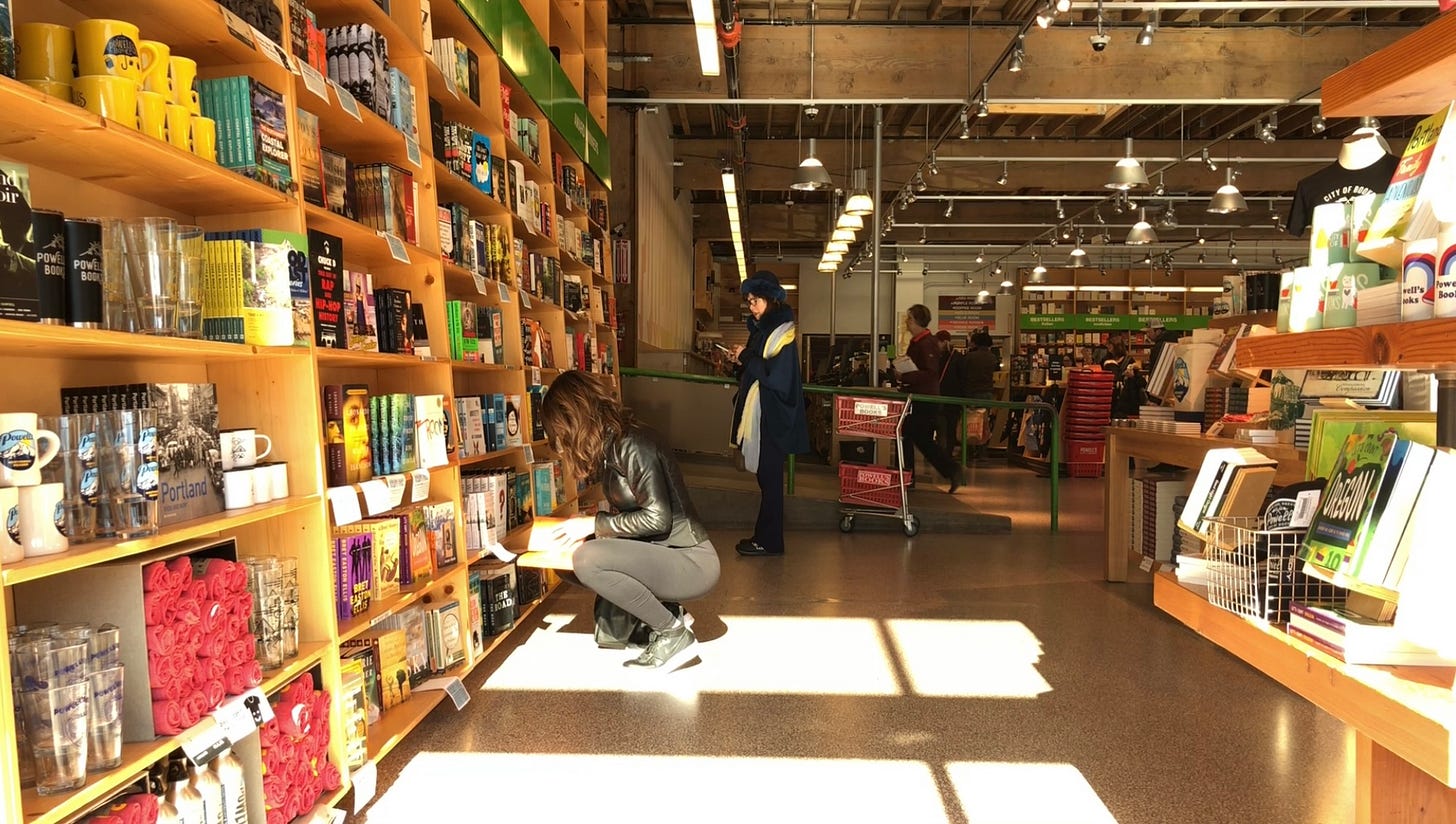How I choose my books
I read over 100 books a year, and I rarely pick DNFs. This is the method to my madness.
This issue is sponsored by Humm Kombucha, which makes the perfect fizzy pairing for a cozy fireplace and a great book (served in a wine glass, obvi)
I don’t actually count the number of books I read a year, but I typically read two to three books a week, I always have a physical book and an audiobook going at the same time, and I’m a fast reader. The most impressive stat, however, is how few DNFs (Did Not Finish) I have each year. I can count on one hand, in fact, which means I’m very good at selecting books I think I’ll like.
Last month I asked my paid subscribers, “What do you want me to write about?” One person replied, “How do you choose the books you read? I have loved every book you’ve recommend, but I would never have picked them up on my own.” Here, I’ll share my very un-scientific process for picking good books for you—because books are highly subjective. (If you didn’t like The Library at Mount Char, we can still be friends, but you’re wrong.)
Where do I find books?
The short answer is “everywhere.” I’m always on the hunt for a new read!
Bookstores: I browse in person a few times a month, whether it’s my local Indie, a bookstore at the airport, during a Target run, or my local library. The “staff picks” are especially insightful, as they usually include a little paragraph about what the staff member likes about the book.
BookTok (social media, particularly TikTok): Though 80% of the videos include books I probably wouldn’t connect with (I’m not a big fantasty, true crime, or romance fan), I do find books I like! That’s where I first discovered Yellowface, which was one of my top books of 2023.
Trusted friends: This is probably my most successful source. I have two people (my sister Kelly and friend Laura McKowen) who reliably share my taste in books. When they recommend a read, I run-don’t-walk (and always return the favor). I hope I can be that person for you!
Amazon/Audible recommendations: The more you rate books on Amazon or Audible, the better the algorithm gets at predicting a book you’ll like. I don’t find most of my books this way, but sometimes it sends me a gem.
My own library: A few times a year, I commit to only re-reading my own 5-star books. They’re always just as good (if not better) the second time through, and this is a budget-friendly way to keep up my reading streak.
Through the narrator: Sometimes an Audible narrator is so good, I’ll find other books they’ve recorded and give them a try. (I’m on a six-book Stephen King run right now because Will Patton is amazing.) This is less reliable, as the narrator probably records lots of different kinds of books, but it’s still a fun search.
Book clubs: I haven’t been part of a book club in ages, but friends who are in book clubs say they read a wider variety of books than they’d choose for themselves, and often find really good reads they never would have picked off the shelf.
Other places to get inspired: Your local library, your neighborhood lending libraries (I always peek at mine), “best of” or “top ten” book lists in major publications (the New York Times, Washington Post, USA Today), Goodreads.
Listen to Your Gut
Whether you're doing the January Whole30, working your food freedom plan, or just not drinking right now, we all want a fun, fizzy way to celebrate the season and support our health. We know that gut health can have an impact on our mental health and our mood. Happily, our friends at Humm Kombucha make supporting your gut health, honoring your health commitments, and treating yourself to a festive beverage easy and delicious.
Some research has found that probiotics may help boost mood and cognitive function and lower stress and anxiety—and kombucha can be a great source of probiotics. Humm Kombucha offers the only Whole30 Approved kombucha (with no added sugar!) in four flavors—Mango Lemon, Mixed Berry, Strawberry Blossom, and seasonal Elderberry—packed with good-for-your-gut probiotics and B vitamins. If kombucha isn't your thing, Humm also makes two tasty Whole30 Approved seltzers in Peach and Raspberry Lime, equally fizzy with billions of probiotics and vitamins B, C and D.
Bring the delicious gut-supporting benefits of Humm's kombucha or seltzer straight to your fridge for 25% off with code HUMM24. Pour it into a fun glass and give yourself a big CHEERS for supporting your gut health and your mental health this January.
How do I choose my books?
This process is 72% woo. When it comes to print books, at least I can mostly just feel the books I’ll like and those I don’t. I’m still finding my groove with audiobooks. Here’s how I approach it:
Read the synopsis. I want to know what I’m getting myself into, and some phrases (like “enemies to lovers”) are red flags for me. I also don’t love comparisons to other bestselling books—seeing “If you loved Gone Girl…” is another red flag. (If your book was really that groundbreaking, it wouldn’t need a comparison.)
Skip the endorsements. I never read these. I don’t care who liked it or what the Times said—they don’t know me.
Flip to a random page. I always do this. If the font, the style of writing, or the pacing is off for me, I can tell in under 10 seconds. I do this with every printed book. (Do not pick a page close to the end. No spoilers!)
Send me a sample. If I’m not sure about a book I’m looking at online, I’ll have Kindle “send me a sample.” This lets me preview the writing and story before spending the money.
Always listen to Audible samples. These aren’t as predictive for me, but listening to an Audible sample is still mandatory. First, it’s important to like the narrator and the recording quality—that can make or break even the best stories. However, often the sample doesn’t give me enough of the story, pacing, and tone to make the right decision. (I have more DNFs on Audible than I do in print, but that may be because I’m a relatively new audiobook listener.)
Maybe read the reviews. I rarely look at reviews. I do see how many stars and reviews a book has, but a low number of reviews won’t stop me! Reviews from others aren’t generally helpful, because everyone’s taste is different, and I’d hate to see a spoiler before I’ve even read the book. But sometimes I’ll feel a pull to read the reviews, and occasionally I can be swayed.
To sum it up, there’s just a vibe—and nothing is a hard-and-fast rule. I don’t like page upon page of text without conversation (my eyes scan for quote marks to help break up the text), but I’ve read nearly every Cormac McCarthy novel, and he doesn’t use quotation marks at all. I sometimes struggle with books with lots of hard-to-pronounce names (fantasy books in particular—Tairneanach, Andarnaurram, and Sgaeyl are like a stutter in my brain), but I mangled my way through Fourth Wing and Iron Flame fast as blazes.
Pick better books, read more books!
These tips should help you more reliably choose books you’ll like, and nail down your own best sourcing techniques. Oh, and before I forget—if you discover you really don’t like a book, don’t finish it. This is your permission slip! Dumping a dud gives you more time to find a book you really will like.
How do you choose a book? Where did you find your most recent favorite book? What tips can you offer so others can more reliably pick winners while expanding your literary world? Paid subscribers can chat in comments.







I'm around 80 books a year and my most common sourcing is you and people ive met here, the GR "lists" and after I've read the book I will sometimes read similarly rated reviews and then "compare books" on GR and see if we match. Then I plow through their top rated reads!
I find the GR "you may also like" to be laughably inaccurate however the overall rating on the site is a key for me. If it's under 4 stars w many reviews, I'll dig a little deeper.
I also take advantage of Amazon First Reads every month and have read some good ones but also some real whiffers.
A couple years ago I also started prioritizing non-white authors and recently worked out my rating percentage. Over 70% of the bipoc-written books I've read are 4+ stars vs the 50% overall. Just because publishers don't promote them the same way says nothing about the quality of their work. For a bipoc person to get published at all says a lot about their book right off the hop!
Long live bedtime reading!!!
Thank you - you know that I will!!!